As Arts Council of Wales CEO Nick Capaldi tells the Culture, Welsh Language and Communications Committee that the arts in Wales is facing “life-threatening issues”, Holly McElroy asks if Welsh Government could be doing more.
Arts Council of Wales Chief Executive Nick Capaldi has told a meeting of Welsh Parliament’s Culture, Welsh Language and Communications Committee that arts in Wales is facing ‘life-threatening issues’ and organisations supported by the Arts Council are ‘losing £1.4 million a week’ as a result of the COVID-19 outbreak.
The most significant impact cited was the loss of ‘cash flow’, meaning that the organisations which most heavily rely on public funding will be the ‘hardest hit’. In the past the arts sector in Wales has been strongly encouraged to become less dependent on public subsidies. The successful response of organisations, such as Chapter in Cardiff and the Wales Millenium Centre, has meant they now receive less than 20% of their funding from public sources. However, under lockdown conditions, this income effectively dried up overnight and according to the ACW, ‘the Wales Millenium Centre could be losing £20m over the current financial year’.
Capaldi also stipulated that current government support schemes were not ‘fit for purpose’ when it comes to the art sector. He cited the failure of the self-employed support scheme which uses criteria that many artists cannot meet due to the nature of their work. Furthermore, such schemes often overlook the younger generation and recent graduates who are being ‘hobbled at the first opportunity of getting a foot on the rung of the ladder’.
One-third of the Arts Council’s sixty-seven portfolio organisations are currently ‘critically dependent’ on the government’s furlough scheme. With that set to end in October, Capaldi raised concerns that unless this is extended, major organisations will be in trouble, particularly the performing arts who cannot imagine a situation where they will be ‘back in serious business before Easter of next year’.
Capaldi outlined the efforts ACW have so far made in tackling these complex issues; such as making contact with principal organisations to identify challenges as well as allowing flexing of rules and regulations surrounding traditional funding programs. Furthermore, they have pulled together funds from within existing resources to create an emergency response fund through which £7m has been provided by the Welsh government with an additional £0.5m from private foundations.
Capaldi said that ACW is about to implement a second scheme to be put in motion at the end of this month. It will focus on more substantial support and giving individuals a leg up onto developing opportunities to sustain work as well as reducing the numbers leaving the arts sector due to financial constraints. Capaldi expanded his vision for this scheme and its success, commenting that ‘artists are nothing if not incredibly inventive and entrepreneurial’.
ACW funding schemes are focused to ensure that those who are most in need, and provide a public cultural benefit receive paramount attention. In a comical but not unenlightening example, Capaldi revealed that of the 29% of applications that were turned down by the council, boyband impersonators were one of the acts decided to be ‘stretching the definition of public cultural benefit too far’. He did not go on to further define what ‘public cultural benefit’ means.
Within the context of an industry in crisis with life-threatening issues, emergency funds and an ever-changing sector, there lies the question of what the Welsh government is doing to help? Capaldi frequently drew attention to the ‘daily contact’ and ‘regular meetings’ with Welsh government and Ministers and the ‘significant challenges’ they are facing across the board. In comparison with the UK government, Wales is doing a lot to help its art sector, Capaldi said, and is ‘plugging the gaps’ where the UK has been unable to help, but did not go into much more detail than that. Communication is one thing, but given that within Wales the arts sector ‘is on its knees and will be the last out of lockdown’, it is hard to not wonder if Welsh government could be doing more.
You might also like…
Arts Council of Wales Chief Executive, Nick Capaldi, offers a personal reflection on recent criticisms of National Theatre Wales.
Holly McElroy is a Wales Arts Review Assistant Editor











